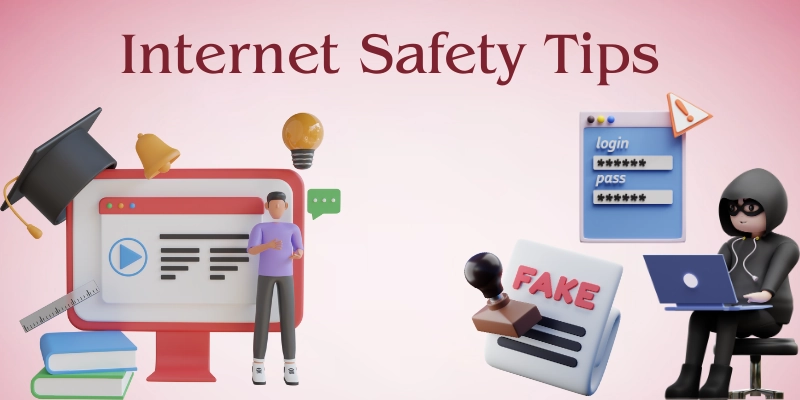Internet Safety Tips: How to Protect Yourself Online Easily
Published: 14 Sep 2025
The internet has become a big part of students’ daily lives, whether it is for studying, entertainment, or staying connected with friends. While it brings many benefits, like quick learning, it also has dangers, such as scams and misuse of personal information.
That is why Internet Safety Tips are so important, as they help young learners enjoy the online world while staying safe and protected.

In this article, we’ll explore Internet safety tips for students.
What is Internet Safety?
Internet safety simply means being safe while using the internet. Just like we learn road safety rules before crossing a road, we need internet safety rules before using websites, social media, or apps.
Why Students Need to Learn Safe Practices?
Students spend a lot of time online for studies, fun, and chatting with friends. If they don’t know how to stay safe, they may:
- Share personal details with strangers.
- Fall into scams or fake websites.
- Face cyberbullying.
- Download harmful files.
- Get distracted from studies.
Learning safe practices helps students use the internet for learning and fun without falling into danger.
Examples
Here are some common unsafe online activities.
- Sharing your home address, school name, or phone number with strangers.
- Talking to unknown people or accepting friend requests from them.
- Clicking on unknown links or pop-up ads.
- Downloading free games, music, or apps from untrusted websites.
- Using the same simple password everywhere.
Common Online Risks for Students
Students use the internet every day for studying, games, and social media. While the internet is helpful, it also has some risks. If students are not careful, they may face problems that can harm their safety, privacy, or studies.
Below are some of the most common online risks for students.
- Cyberbullying: When someone sends hurtful messages, posts mean comments, or spreads lies online. This can affect a student’s confidence and mental health.
- Phishing and scams: Fake emails, messages, or links that try to steal personal information like passwords or bank details.
- Fake websites and apps: Some sites or apps pretend to be real but may steal information or put viruses on devices.
- Personal information: Telling strangers about your phone number, school name, or address can be dangerous.
- Online games and social media: Spending too much time online can affect studies, sleep, and health.
When students learn about these risks, they can make better choices online. Knowing the dangers is the first step toward staying safe on the internet.
Privacy
Students should always keep their personal details private on the internet. Sharing too much information can put them in danger.
- Sharing Details: Strangers can misuse these details to harm you or trick you.
- Think Before Sharing Media: Once you upload them, anyone can copy or share them without your permission.
- Use privacy settings: Privacy tools help control who can see your posts, profile, and personal data.
Being careful with personal information keeps students safe and protects them from online risks. A small step of caution makes a big difference.
Passwords
Passwords work like keys to your online accounts. Strong passwords protect students from hackers and keep information safe.
- Unique Passwords: Choose different passwords for different accounts.
- Avoid Easy Guessing: Don’t use birthdays, names, or simple numbers.
- Change Regularly: Update passwords from time to time for better safety.
- Keep Private: Never share your passwords with anyone.
Strong passwords are the first line of defense against online dangers. They keep accounts secure and protect personal information.
Social Media
Social media is fun, but it can also be risky if not used wisely. Students should follow safe habits to protect themselves online.
- Think Before Posting: Share only safe and respectful content.
- Avoid Strangers: Don’t accept friend requests from unknown people.
- Report and Block: Stop suspicious or harmful accounts immediately.
- Limit Screen Time: Use social media in balance with studies and rest.
Using social media carefully helps students enjoy it without facing problems. A little care makes online life safer and healthier.
Scams
Scammers often use fake emails, websites, or ads to trick students. Learning how to spot them can keep personal information safe.
- Phishing Emails: Be careful of emails asking for passwords or personal details.
- Unknown Links: Avoid random ads, pop-ups, or links from strangers.
- Website Security: Use only sites that start with https:// for safety.
- Common Scams: Fake prize messages or “You won a gift” are tricks to steal data.
Recognizing scams early protects students from hackers and money loss. A little awareness can stop big problems online.
Cyberbullying
Cyberbullying happens when someone uses the internet to hurt others with mean words, threats, or lies. Students must know how to stay safe and deal with it.
- What It Means: Cyberbullying is when people send hurtful messages or spread rumors online.
- Handle Bullies: Don’t reply, but report and block the bully.
- Tell a Trusted Adult: Share the problem with a parent or teacher for help.
- Support Friends: Stand with friends who are bullied and encourage them to speak up.
Stopping cyberbullying needs courage and support. When students stay strong and seek help, the internet becomes a safer place for everyone.
Online Learning
Online classes are very helpful for students, but safety rules are important. Following safe practices makes online learning smooth and secure.
- Trusted Platforms: Join classes only on trusted websites or apps.
- Links Private: Never share Zoom or Google Meet links with strangers.
- Official Stores: Download apps only from Google Play or App Store.
- Teacher’s Rules: Always listen to the teacher’s safety guidelines during classes.
Safe online learning helps students focus on studies without risks. A little care ensures both knowledge and security.
Devices
Keeping devices and the internet safe is just as important as using safe websites. Good security protects students from hackers and harmful software.
- Install Antivirus: Use antivirus software to stop viruses and malware.
- Update Regularly: Keep apps and software updated for better protection.
- Strong Wi-Fi Passwords: Secure your internet with difficult passwords.
- Lock Devices: Use a PIN, password, or fingerprint to protect your device.
A secure device and internet connection keep personal data safe. Simple steps like updates and passwords make a big difference in online safety.
Balance
The internet is useful for learning and fun, but too much use can harm health. Students should follow healthy habits to keep life balanced.
- Screen Breaks: Rest your eyes and body after using devices.
- Late Night Browsing: Avoid staying online too late at night.
- Offline Time: Spend moments with family and enjoy hobbies without screens.
- Study and Fun: Use the internet for both learning and entertainment in the right way.
Balanced internet use keeps students healthy, happy, and focused. A little discipline helps in enjoying technology without problems.
Guidance
Parents and teachers play an important role in keeping students safe online. Their guidance helps children use the internet in a smart and secure way.
- Rules at Home: Parents should make simple rules for safe internet use.
- Digital Safety: Teachers can explain online safety in class lessons.
- Encourage Communication: Students should feel free to talk to adults when facing online problems.
With the support of parents and teachers, students learn safe habits early. Guidance and open talks make internet use safer and more positive.
Conclusion
So guys, in this article, we’ve learned about internet safety tips for students. The internet is a powerful tool, but it needs safe and responsible use. By being careful online, students can protect themselves while enjoying the benefits of learning and connection.
Always remember, using the internet wisely today builds a safer tomorrow.
Stay safe, stay smart, and always remember that a little care online can protect you in a big way. Share your feedback in the comment section below!
FAQs
Have questions about staying safe online? Find the answers in the FAQs below!
Online safety is important because it protects people from scams, hackers, and harmful content while using the internet. It also helps keep personal information secure and builds a safe online experience for everyone.
Internet safety is important for students because it protects them from cyberbullying, scams, and harmful websites. It also helps them use the internet wisely for learning without risking their privacy or personal information.
Students should not share personal information online because it can be misused by strangers or cybercriminals. Keeping details like address, phone number, or school private helps them stay safe on the internet.
Students can create strong passwords by using a mix of uppercase and lowercase letters, numbers, and symbols. They should avoid using simple words or personal details and make the password long and unique for better safety.
It is not safe to talk to strangers online because they might hide their real identity and try to trick students. Staying away from unknown people helps protect privacy and prevents possible dangers.
If students face cyberbullying, they should not reply to the bully and must save the evidence. They should immediately tell a parent, teacher, or trusted adult and report the bully to stay safe.
Students should not click on unknown links or ads because they may lead to harmful websites or download viruses. Avoiding them helps protect the device and keeps personal information safe.
It is important to log out of shared computers because others could misuse personal accounts or private information. Logging out keeps data safe and prevents unauthorized access.
Students can download free games or apps safely only from trusted app stores or official websites. Downloading from unknown sources can bring viruses or harmful software to their devices.
The best way for students to stay safe online is by using strong passwords, avoiding strangers, and not sharing personal details. They should also visit trusted websites and talk to adults if they face any problem.

- Be Respectful
- Stay Relevant
- Stay Positive
- True Feedback
- Encourage Discussion
- Avoid Spamming
- No Fake News
- Don't Copy-Paste
- No Personal Attacks

- Be Respectful
- Stay Relevant
- Stay Positive
- True Feedback
- Encourage Discussion
- Avoid Spamming
- No Fake News
- Don't Copy-Paste
- No Personal Attacks





